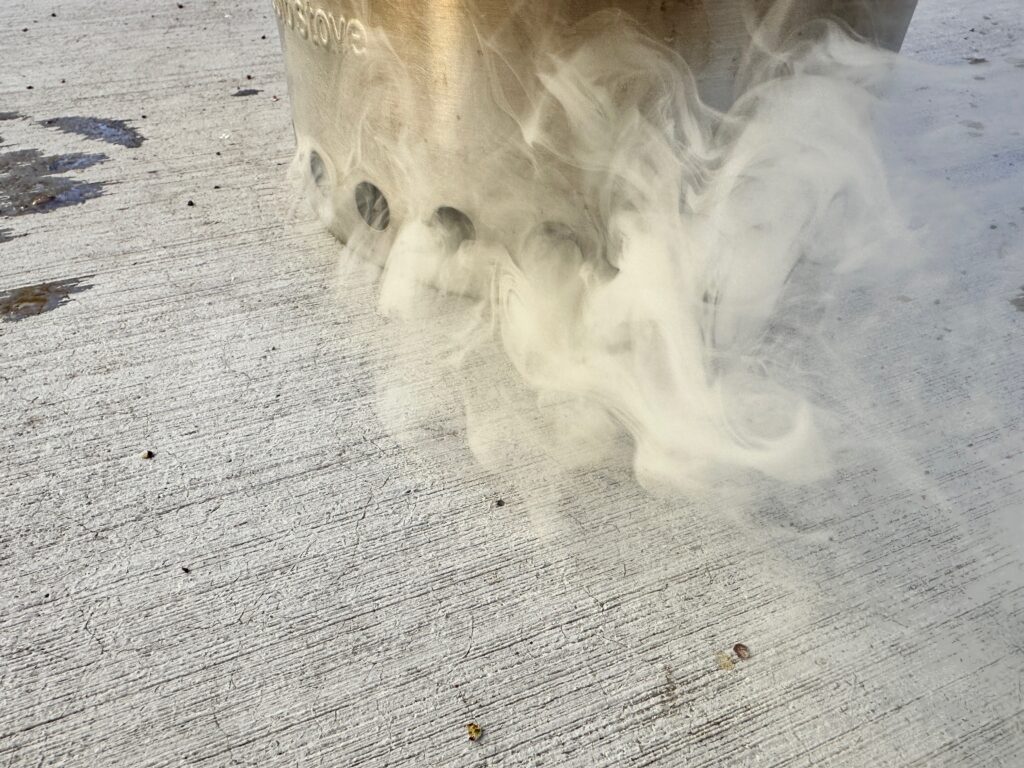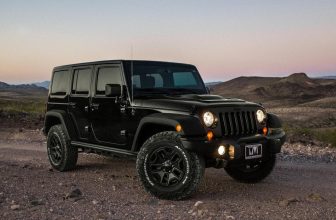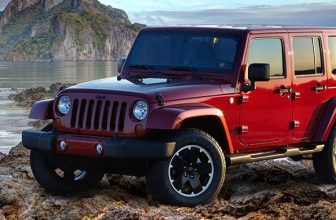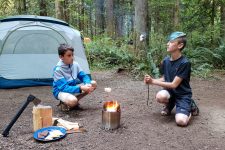
Solo Stove Campfire Review | CleverHiker
Bottom Line
The Solo Stove Campfire is a great option on our list of the best camping stoves for those looking for a wood-burning stove. Its design maximizes airflow so that a brilliant fire can erupt from almost nothing.
However, this stove does take some getting used to. Compact and finicky, creating fire in this stove is not as easy as setting one up in a fire ring at camp. Plus, this stove requires constant attention and timely addition of wood. Overcrowding fuel can cause massive amounts of smoke.
One of the major benefits of this stove is that it does not use propane or butane to fuel. This can feel like a relief to those looking to reduce their environmental imprint. However, leaving the gas canisters at home decreases the reliability of the burn, simmer ability, and even cooking. By using natural fuel, this stove does require knowledge, skill, and patience.
When we tested, we found that the most reliable fire comes from the “second burn.” Each time we started a fire in the Solo Stove, we encountered a lot of smoke. The first time, we got a fire going, but it burned out within 2 minutes.
The second, we burned through the first kindling. When we added more, the stove produced a good fire with little smoke. The third time, we overcrowded the stove with fuel and produced too much smoke (we began getting attention from other campers).
We suggest practicing building a fire on this stove before relying on it at camp for cooking food. We also suggest researching common fire restrictions in the areas you camp –– some campgrounds, counties, state park systems, etc do not allow wood-burning stoves.
How We Tested
We tested this stove on three different camping trips, each time with sticks and twigs we found around camp plus wood shavings as a firestarter.
Quick Specs
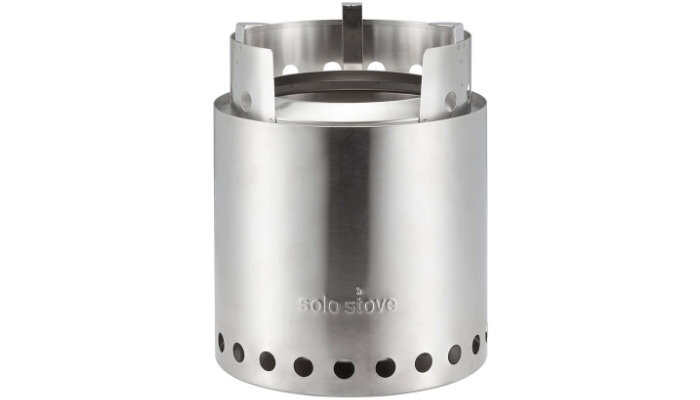
Solo Stove Campfire
Best Wood-Burning Camping Stove
CleverHiker Rating:
3.8/5.0
Price:
$110
Weight:
2.2 lb.
BTUs (per burner):
Varies
Number of Burners:
1
Fuel Type:
Wood
Efficiency:
4.2
Boil Time:
n/a
Ease of Use:
3.6
Pros
- Powerful
- Versatile
- Wind Guards
- Lightweight
- No need to buy fuel
Cons
- Can’t use under fire restrictions
- Can be smokey
- Difficult to start
- Needs constant attention
- Messy
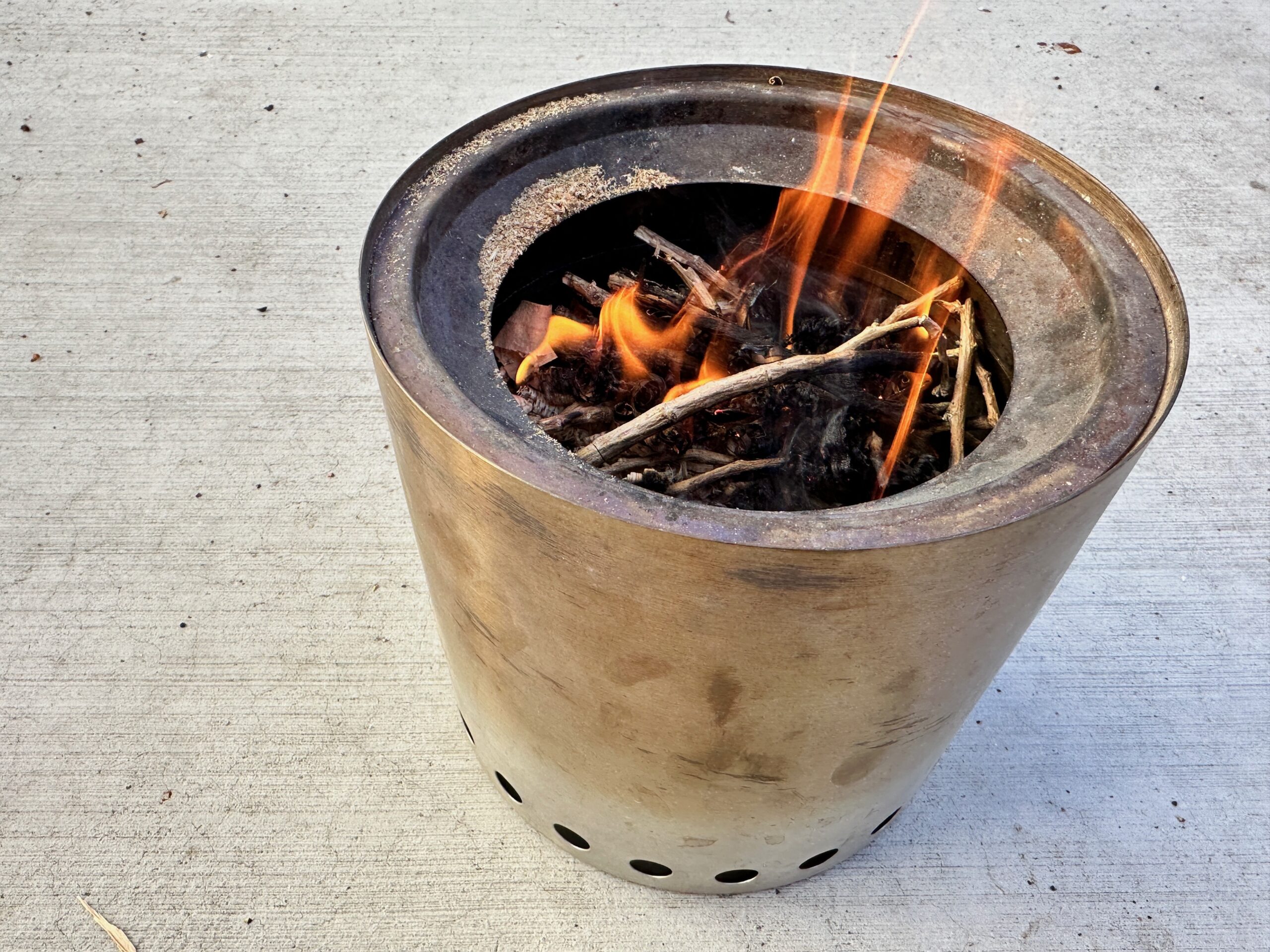
Power, Cooking Ability, & Fuel Efficiency
Solo Stove claims that the stove is so easy that a novice can boil water within ten minutes. We did not find this to be true, nor did we find that we could keep a fire lit long enough to cook our breakfast.
This was the first time our gear analyst used a Solo Stove. She found that the confined space of the stove was more difficult to get a fire going than in a fire pit. This stove, she found, may not be the best for a beginner to rely on.
We took this stove out on three separate tests. The first we were at a campground after a frost and had to rely on damp sticks plus the firestarter that we brought. Understandably, this combination produced a lot of smoke –– though we did get enough flame from the firestarter to roast a marshmallow.
Our next two attempts, we used wood shavings or paper and dry sticks. We found that we should have used larger pieces of wood. We got the fire started each time. As the flame started to die down, we would add more tinder –– small sticks or dried leaves. When dried leaves or more wood shavings were added, the fire would go and die before catching on the sticks. We’d add more, but then the smoke would start. It was overpowering smoke.
One of these attempts did result in a blazing fire for about 8-10 minutes. This “second burn” is what other user reviews say is the goal. While the first burn can be smoky and temperamental, if you can get to this second burn, you will get a fire that fills the stove and produces little smoke.
Here are things we recommend to get here: use a reliable firestarter like a cotton ball soaked in vaseline; build a fire using small sticks over the firestarter and then larger one; limit the amount of quick-burning things like leaves, paper, or pine needles. The larger size sticks we think would work would be thicker than a crayon around, but short enough to below the stove’s opening.
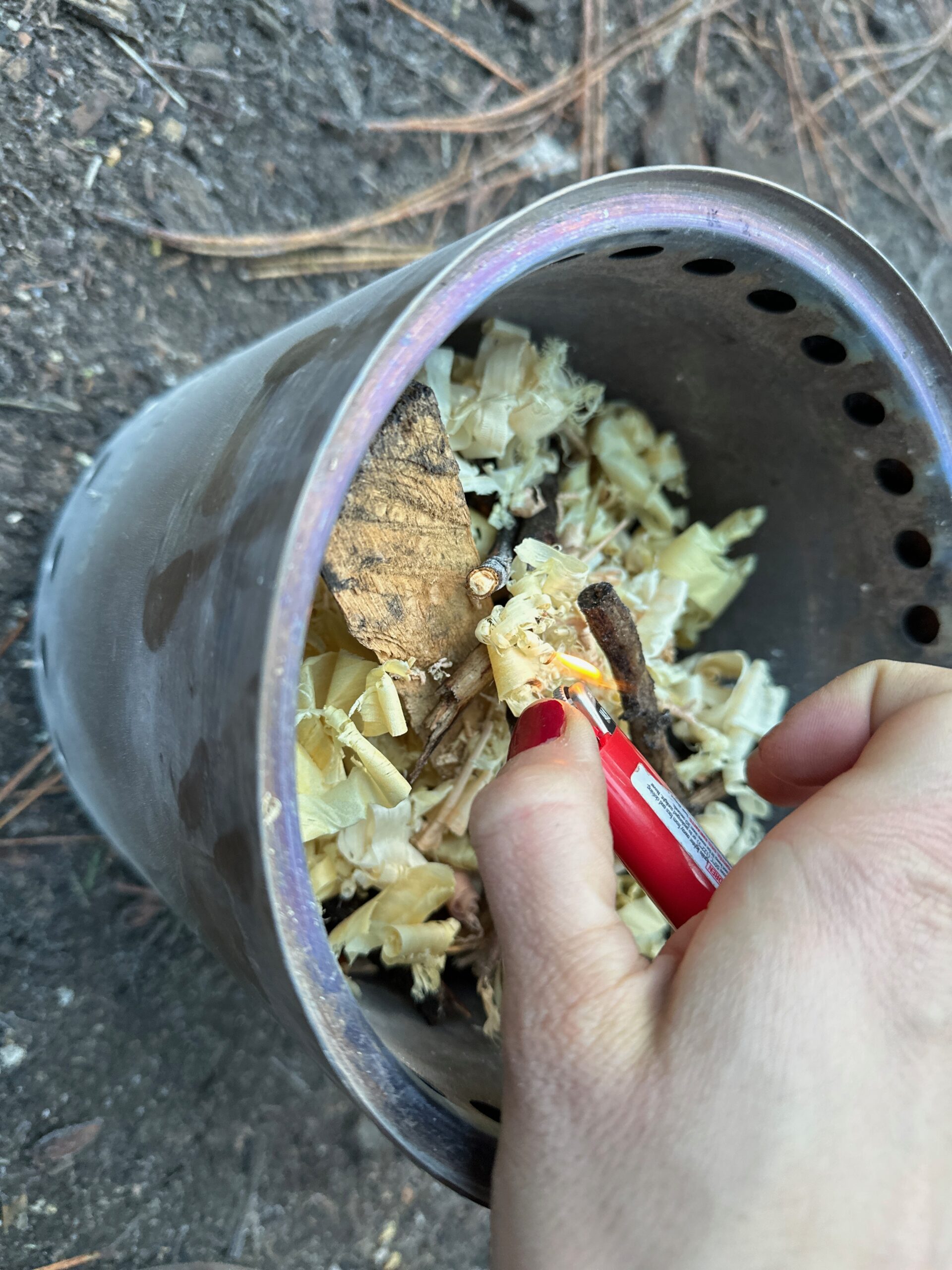
Portability
We loved that this stove nests within the pot it comes with and fits inside a carrying bag. However, the stove can get really ashy and, even when packed up, it left a mess in our car when transporting to and from camp. We needed towels and extra water to clean out the pot when we got to camp and wanted to use it to cook our food. We do love how small the stove packs up though, and its light weight makes it easy to carry, even with arms full.
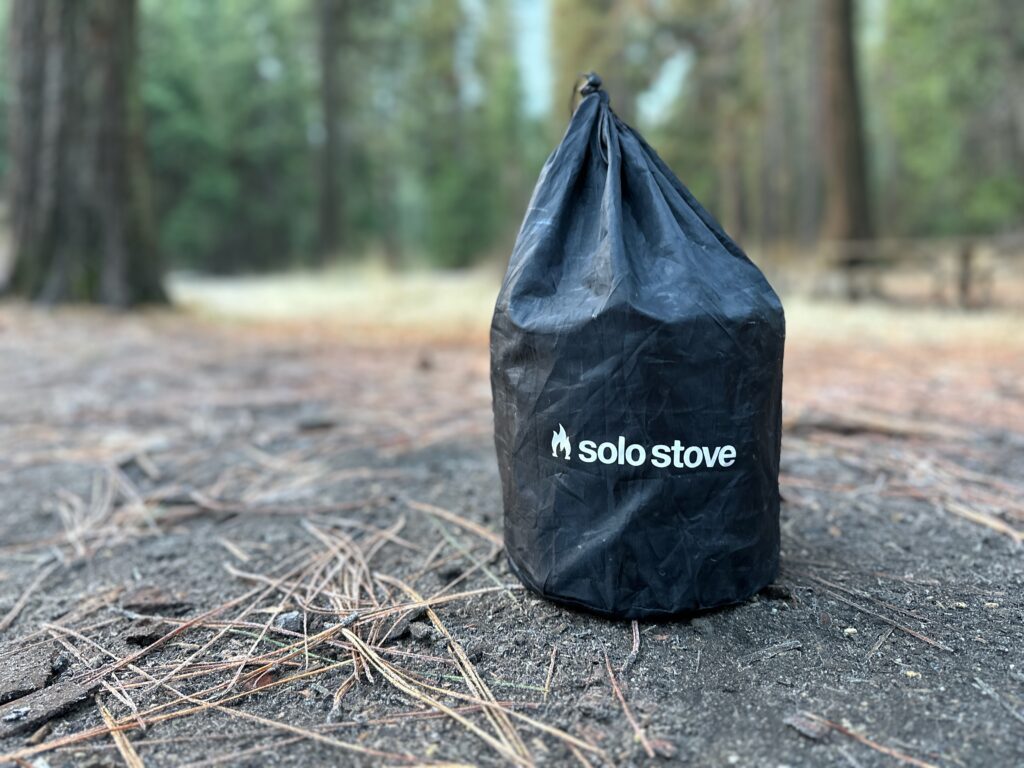
Ease of Use
While the Solo Stove provides the versatility of a wood-burning fire pit and camp stove, there are several considerations when thinking about taking this on a camping trip. First, not all areas or campgrounds allow wood-burning stoves. Please check regulations before using. The stove is also best used on the ground, which though not the worst, can make things more challenging.
Solo Stove company confirms that the stove needs to be placed on a heat-resistant surface when in use. You cannot place this on a picnic bench to cook. Concrete, stone, a firepan, or dirt is ideal.
As we mentioned above, there is a learning curve to this stove that can make it difficult for a beginner to use or to reliably produce heat. To use, you must either pack in wood or gather when at camp. We also suggest packing your own fire starters as small things like pine needles and dried leaves don’t burn long enough to catch larger twigs on fire. Finally, it might go without saying, but you must bring a lighter or matches to start this stove.
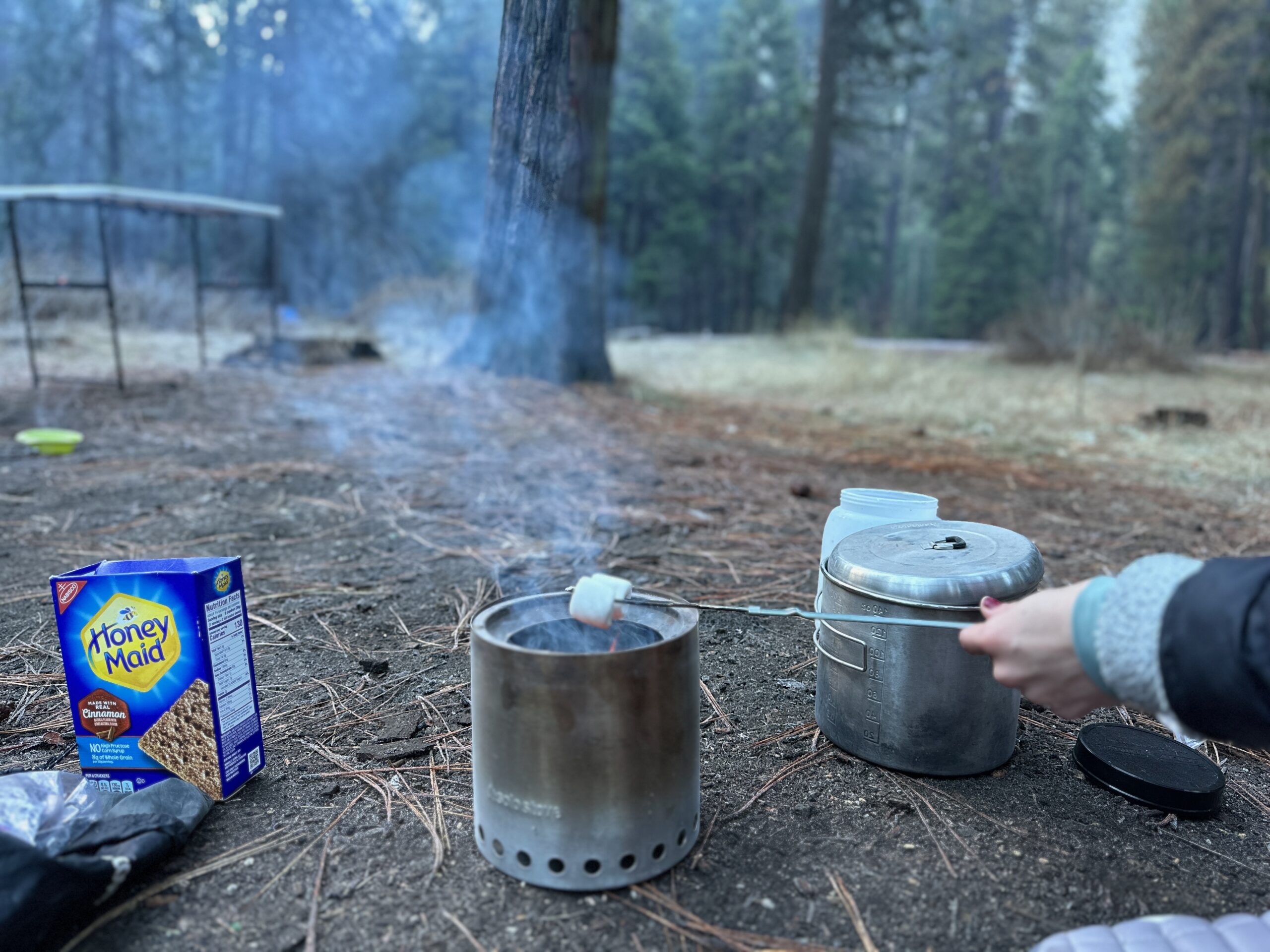
Should You Buy the Solo Stove Campfire?
This stove can be a great option for someone who wants to use natural, renewable fuel for their stoves. It is also great for those who want a fire pit along with a stove, for gathering around or roasting marshmallows.
This stove is not great for people who live in areas with frequent fire restrictions. It may also not be a good option for a beginner who needs more reliability as they are getting used to becoming a camp chef.

What Other Camp Stoves Should You Consider?
Eight other stoves made our list of favorites this year. Browse the full camp stove gear guide to see what else we recommend.
Coleman Cascade 3-in-1 Camp Stove Review: This one also has the ability for a flat top grill, but gives you a slatted grill, and a burner, making this a more versatile stove for those wanting to pull out all the camp cooking stops. It is very beginner-friendly, too.
Jetboil Genesis Basecamp System Review: The Jetboil is a double-burner that folds down to about the size of the Solo Stove. Also, like the Solo Stove, it comes nested in a pot and a pan to make packing your cooking set up easy.
Gas ONE GS-3400P Review: This stove allows for the versatility of using either propane or butane. It is also light weight, easy transport, and easy to pack. This stove is also very easy to use for a beginner.
